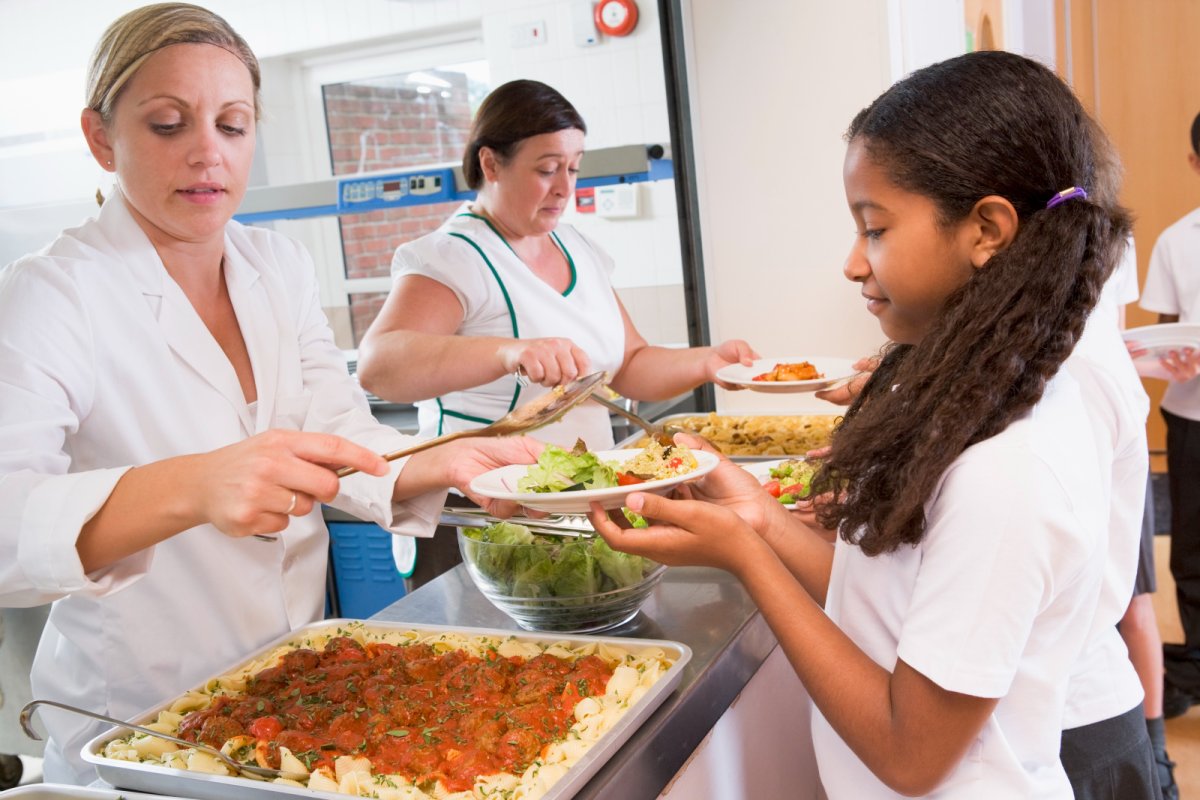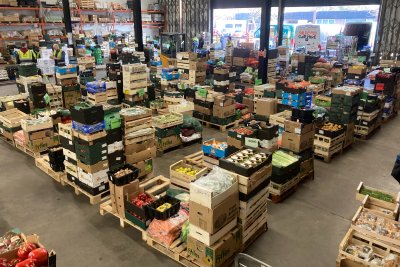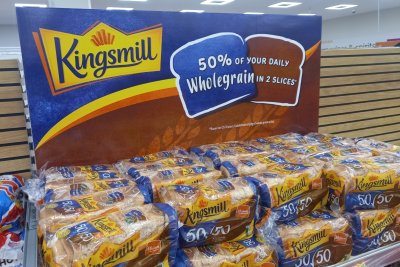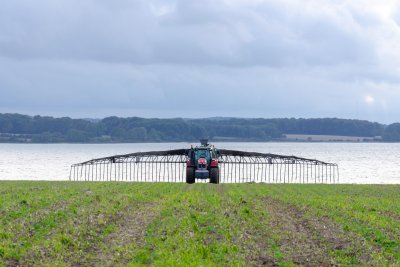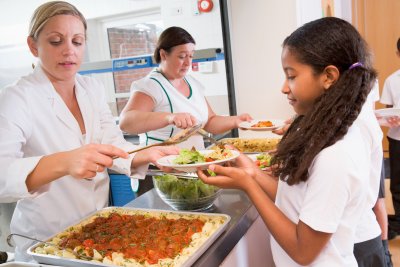 Children getting lunch at a school canteen.. Credit: mnonkeybusinessimages: iStock
Children getting lunch at a school canteen.. Credit: mnonkeybusinessimages: iStock
Parents Speak Out: Beyond breakfast, what really needs to happen on school food?
In the first of two blogs, Children’s Food Campaign Officer Naema Jannath talks to parents about progress on healthy children's food over the past year, starting with food in our schools and what they would like to see considered in the new food strategy and government policy.
In April 2024, a group of 13 passionate parents stood up and launched a powerful call to action: the Our Children, Our Future Parents’ Manifesto. This was on the back of a nation-wide polling, involving insights from over 2000 parents across the UK. The parent ambassador took the manifesto to Westminster last October and shared their firsthand experience of the barriers to ensuring children can eat healthily with MPs and peers.
Now, a year later since its launch, it’s time to take stock. What progress have we made in school food? Where has the government listened — and where are they still falling short?
Breakfast & beyond
The government has committed to a new primary school breakfast club programme, with pilots beginning with the first 754 school from 22 April onwards. The pilots will help shape the national policy aimed at ensuring all primary-aged children have access to a free breakfast club and at least 30 minutes of free childcare each day. We have been clear in arguing that this can’t just be a free childcare service, the breakfast itself should be healthy, nutritious and inclusive of all children's dietary needs.
However, a gap in provision will remain for secondary school children as Labour’s breakfast club pledge is only on primary schools. Funding for the current National School Breakfast Programme is only committed until the end of 2025/26 academic year, and the future beyond that is uncertain. Any impact will be felt most by schools in high-deprivation areas that are currently benefiting from subsidised breakfasts.
Our parent ambassadors welcome the new breakfast initiative, but it should not be seen as a substitute for lunch.
Agnieszka, parent ambassador says:
It’s great that the government has committed to introducing breakfast clubs for all primary school children. However, as both a parent and a school chef who runs the breakfast clubs, I know that many children struggle to get to school on time or sometimes skip breakfast. Breakfast clubs should not be seen as a substitute for lunch, and they should be rolled out alongside expanding free school meals to all children at lunchtime. Lunch is just as important to keep children focused and fuelled for learning, with so many more benefits for children's health, wellbeing and future success.
School Food for All
Evidence time and time again has shown that free school meals provides numerous economic and health benefits such improvement in attendance, attainment and wellbeing of children. Expanding access to healthy school food came as parents’ number one priority in our polling with 3 in 4 parents supporting the expansion of free school meals from nursery to sixth form.
It’s fantastic to see primary school meals expanded in London, Wales & Scotland but there is an unfair postcode lottery across the UK. The threshold for eligibility for free school meals remains stuck at just £7400 per annum income (after tax, before benefits), and has not been reformed since introduction in 2018. This is severely impacting the 900,000 children living in poverty but do not quality for free school meals.
Zoe, parent ambassador says:
As a parent who has children on free school meals, it was a relief to have one less thing to worry about. It reduces financial stress. But in my experience children can also feel nervous about having free school meals, and unsure about admitting it to people. Having free school meals for all would help reduce stigma attached to free school meals and create an equal environment
Mandy, parent ambassador says:
As a parent outside of London, I find it unfair that there is a postcode lottery of school meals. I want the government to invest in children’s health and their futures by extending school food to all children no matter their location or age. It's also important to me that the quality of food is considered.
Even among the households who meet the £7,400 per annum income threshold for entitlement to Free School Meals, an estimated one in ten children are not registered and therefore unable to receive the hot lunch to which they are entitled. Many local authorities have been using existing welfare data to identify families that are not registered for free school meals, and gain permission to enrol their children. However, this presents challenges with access to data, lack of funding for councils and national model. This needs a cross department approach where DWP and DfE work together to ensure effective data sharing and no child is losing their right to a school meal
When Universal Credit was introduced, the government put transitional protections in place to make sure that children didn't lose their free school meals because of temporary changes in their family's income or shifts in the benefits system. These protections meant that any child who qualified for free school meals at any time since 1 April 2018 could keep their eligibility for the rest of the current phase of education (primary/secondary), even if their family’s income later went up or their benefits situation changed. However, from April this year, this protection no longer applies, meaning 500,000 children will lose access to their school meal over the next 6 years. This risks children who live in households with income volatility each year (above or below the £7,400 annual income threshold), to fall in and out of FSM entitlement.
Transitional protection was just a temporary plaster on a complicated system. It can create an unequal system where some better-off children still receive free school meals due to past eligibility, while others in more need do not qualify under current thresholds. Instead the government should redirect this funding released to expanding free school meal eligibility and implementing national auto-enrolment. These echo the amendments laid as part of the Children’s Wellbeing and Schools Bill to increase eligibility for school meals, monitor and enforce school food standards and bring in auto-enrolment.
Parents want more focus on quality of school food
Expanding access to school meals is vital - but so is making sure what’s on the plate is actually good for our children. Our polling found that only 55% of parents consider their children’s school meals nutritious, with confidence lower among parents of secondary school pupils than those of primary-aged children.
Currently, there is no system in place to monitor if schools are being compliant with school food standards. We also know very little about the quality of food in early years settings. Although there are food and drink guidelines for nurseries and childcare, they are voluntary and not always used. Parents want school food quality monitored and improved, including more healthy options on school menus that is culturally inclusive, more fruits and yoghurts instead of sugary puddings.
Mandy, parent ambassador says:
Any school food should be nutritious and well-balanced and shouldn't contain ultra processed foods or too much sugar. Now that my children are older it's also important to me that secondary schools aren't forgotten as there are often unhealthy food options available for teenagers and this needs to change
Food Education at the core of our school curriculum
In November 2024, the government launched a review of England’s national school curriculum to ensure it continues to meet the needs of today’s children and young people. In response, Children’s Food Campaign parent ambassadors submitted a series of key recommendations, alongside an open letter, urging policymakers to place food education at the heart of an updated curriculum that actively encourages our children to engage in learning about food, from farm to fork.
Clare, parent ambassador says:
It’s important the school curriculum takes into account food, nutrition and children’s own health. There needs to be consistent language demonstrating to children the links across PSHE, Science, Food Technology and PE.
The curriculum review group issued its interim report in March 2025, and so far there is not much sign that food and nutrition is being given higher priority. The polling done with parents also didn’t give them the option to select food, nutrition and cooking skills in terms of building life skills, which was a serious omission. Sustainability and climate education are however making their way into the spotlight. Particular areas for the next stage review includes helping students prepare for the future by teaching skills for a fast-changing, tech-driven world and offering better support for post-16 education paths beyond A levels. We urge the curriculum team to consider how food education can better incorporated into the curriculum to ensure our children are leaving school leading healthy happy lives.
Overall, in relation to our parents' manifesto calls for healthy, sustainable school food for all, there is an increasingly urgent need to address the growing and connected issues of funding, access and quality, as our parents highlighted recently in Parliament, and the Children's Food Campaign will continue working with our partners in the School Food Review Group and calling for change via our Say Yes to School Food For All campaign - please join us!
Children's Food Campaign: Campaigning for policy changes so that all children can easily eat sustainable and healthy food.
Sustain
The Green House
244-254 Cambridge Heath Road
London E2 9DA
020 3559 6777
sustain@sustainweb.org
Sustain advocates food and agriculture policies and practices that enhance the health and welfare of people and animals, improve the working and living environment, promote equity and enrich society and culture.
© Sustain 2025
Registered charity (no. 1018643)
Data privacy & cookies
Icons by Icons8
